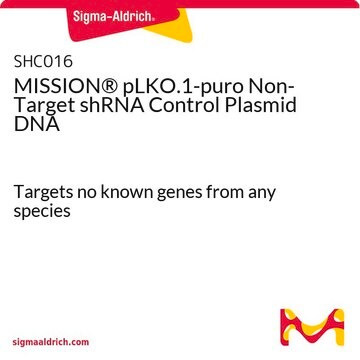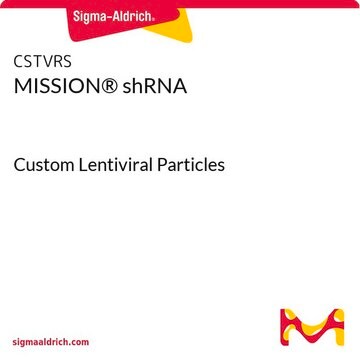SHC003
MISSION® pLKO.1-puro-CMV-TurboGFP™ Positive Control Plasmid DNA
Green fluorescent protein marker to monitor transduction efficiency
Synonym(e):
MISSION® Control Vectors
About This Item
Empfohlene Produkte
Produktlinie
MISSION®
Konzentration
500 ng/μL in TE buffer; DNA (10μg of plasmid DNA)
Versandbedingung
dry ice
Lagertemp.
−20°C
Suchen Sie nach ähnlichen Produkten? Aufrufen Leitfaden zum Produktvergleich
Verwandte Kategorien
Allgemeine Beschreibung
Ampicillin and puromycin antibiotic resistance genes provide selection in bacterial or mammalian cells respectively. In addition, self-inactivating replication incompetent viral particles can be produced in packaging cells (HEK293T) by co-transfection with compatible packaging plasmids. The TurboGFP Control Vector is provided as 10 μg of plasmid DNA in Tris-EDTA (TE) buffer at a concentration of 500 ng/μl.
Anwendung
Rechtliche Hinweise
Empfehlung
Lagerklassenschlüssel
12 - Non Combustible Liquids
WGK
WGK 1
Flammpunkt (°F)
Not applicable
Flammpunkt (°C)
Not applicable
Analysenzertifikate (COA)
Suchen Sie nach Analysenzertifikate (COA), indem Sie die Lot-/Chargennummer des Produkts eingeben. Lot- und Chargennummern sind auf dem Produktetikett hinter den Wörtern ‘Lot’ oder ‘Batch’ (Lot oder Charge) zu finden.
Besitzen Sie dieses Produkt bereits?
In der Dokumentenbibliothek finden Sie die Dokumentation zu den Produkten, die Sie kürzlich erworben haben.
Kunden haben sich ebenfalls angesehen
Artikel
When shRNA is delivered using lentiviral vectors, the sequence encoding the shRNA is integrated into the genome and the knockdown effect is passed on to daughter cells, continuing gene silencing.
Unser Team von Wissenschaftlern verfügt über Erfahrung in allen Forschungsbereichen einschließlich Life Science, Materialwissenschaften, chemischer Synthese, Chromatographie, Analytik und vielen mehr..
Setzen Sie sich mit dem technischen Dienst in Verbindung.











